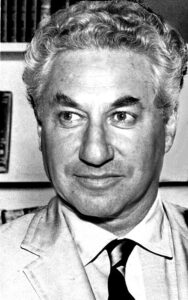
Budd Schulberg (March 27, 1914 — August 5, 2009) was born in New York City to Hollywood film producer B.P. Schulberg and his wife Adeline Jaffe. He attended Deerfield Academy, a private preparatory school in Deerfield, Massachusetts, and then went on to Dartmouth College, where he was a member of Pi Lambda Phi fraternity, a writer for the Dartmouth Jack-O-Lantern humor magazine, and a collaborator with F. Scott Fitzgerald on a screenplay for Winter Carnival, a romcom set at Dartmouth.
In 1936, Schulberg and his first of four wives, Virginia “Jigee” Lee Ray married and had a daughter, Victoria. They divorced in 1942. The next year, he married Victoria “Vickee” Anderson, and they had two sons, Stephen and David, before they were divorced in 1964. His third wife was the actress Geraldine Brooks, to whom he was married from 1964 to her death in 1977. That same year, he married Betsy Ann Langman, with whom he had two children, Benn and Jessica.
In 1941, Schulberg’s first novel, What Makes Sammy Run?, was an indictment of Hollywood’s studio system. Its cold-blooded, driven protagonist, Sammy Glick, was so obviously Jewish that Schulberg was accused of antisemitism. When a higher-up in the Communist Party of the USA demanded that Schulberg make changes in the novel to conform to Communist dogma, he quit the party.
During World War II, he was assigned to the Office of Strategic Services, and gathered evidence against Nazi war criminals for the Nurenberg trials. He arrested Nazi propaganda filmmaker Leni Riefenstahl who was charged with being a Nazi fellow traveler but not a war criminal.
In the 1950s, Schulberg published The Disenchanted, a novel loosely based on Schulberg’s previous association with Fitzgerald. It was made into a Broadway play. Another successful script was for On The Waterfront, the 1956 movie dramatizing organized crime’s influence over labor unions.
He wrote the screenplay for the 1957 film A Face in the Crowd, and the following year collaborated with his younger brother Stuart on the screenplay and production of Wind Across the Everglades. In addition to his screenwriting, Schulberg also was the chief boxing correspondent for Sports Illustrated.
After the Watts riots of 1965, Schulberg helped establish the Watts Writers Workshop in an attempt to provide creative opportunities in the economically stifled area of Los Angeles. In 1982, he published the autobiographical Moving Pictures: Memoirs of a Hollywood Prince and in 1995 he published Sparring with Hemingway, a collection of his descriptions of memorable championship fights over nearly a half-century.
Tomorrow, March 28: Rudolf Serkin
*
SDJW condensation of a Wikipedia article.